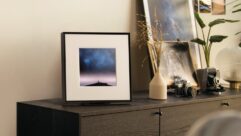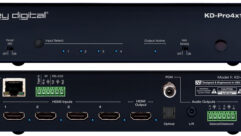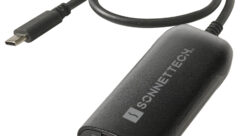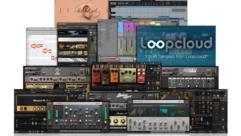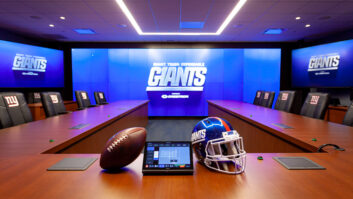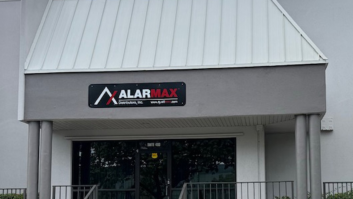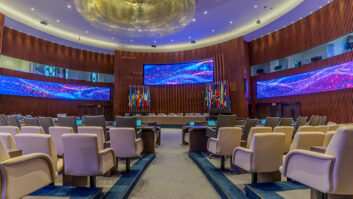
Allen & Heath iLive MixPad for Worship, Part 2
Feb 16, 2012 1:09 PM,
With Bennett Liles
Listen to the Podcasts
Editor’s note: For your convenience, this transcription of the podcast includes timestamps. If you are listening to the podcast and reading its accompanying transcription, you can use the timestamps to jump to any part of the audio podcast by simply dragging the slider on the podcast to the time indicated in the transcription.
From Sound & Video Contractor Magazine, this is the SVC Podcast Show 51 Part 2 with John Williams of Entertainment Arts. Show notes for the podcast are available on the website of Sound & Video Contractor Magazine at svconline.com.
The First Baptist Church of Altamonte Springs, Fla., had a patchwork sound system, and they called Entertainment Arts of Orlando to upgrade and straighten it all out. John Williams is back to finish his account of how it all came together and how it works now, next up on the SVC Podcast.
SVC: All right, John Williams back for part 2 on the First Baptist Church of Altamonte Springs, Fla., and you got them started with a complete audio upgrade with an Allen & Heath iLive T-112 mixer and on the Mixpad application for iPad, what you eventually got on this mixer was a Dante card and why did you go with Dante since there are lots of other digital audio conveyance formats. You’ve got Ethersound and other competing topologies for this. What are the capabilities and what do you get from the Dante protocol on this?
John Williams: Well, there are a lot of capabilities with the Dante card. Ethersound is great, but it’s expensive. That’s one downfall with Ethersound, same with MADI. MADI is another great protocol to be able to record with to multitrack, but it’s also expensive because you need a MADI interface on top of your recording software, your Azio drivers and all those kinds of things. The great thing about Dante is before it was very difficult to try to multitrack a high number of channel count in any church because if you wanted to do 32 channels you would, most of the time, either need MADI with an interface or you would need a full ProTools rig with all the I/O interfaces and it would cost some serious money to do that. When Dante released what’s called their Brooklyn 2 module, it allowed for a 64-channel by 64-channel interface over IP protocol, which means you got 64 inputs and 64 outputs over a single Cat-5 cable, and the way that works is since it’s working with an IP protocol, they were able to take the Ethernet port on any computer and turn that into the audio interface. So come right out of the Dante module with a Cat-5 cable and into the Ethernet port on your computer and you’re sending 64 channels to the computer and you’re able to send 64 channels right back out to the Dante card, which goes right back into the iLive system. [Timestamp: 2:46]
Well, the physical hookup doesn’t get any easier than that.
It’s literally a plug-and-play card. Audinate made a great software called Dante controller, which pretty much works just like a matrix. You just intersect your points on where you want to send your audio from, what channel to what channel, and you click it and it gives you a green check mark and as soon as that green check mark comes up, your audio’s flowing. It’s really that simple. Now of course, I say any computer, but most of the time when you’re multitracking 64 channels of audio WAV files you want the computer to be fairly robust; probably you’ll want at least 4GBs of RAM on this machine and a pretty fast hard drive so you can multitrack that much channels, but other than that, most people who are to doing production are using Apple. You can pretty much walk into an Apple store, buy a MacBook Pro, and that’s going to be your recording computer. [Timestamp: 3:37]
And as you were telling us back in part 1, you got the Allen & Heath Mixpad app for the iPad. Now, when you got this did the church go ahead and buy iPads for all the band members or did that idea come as a result of the success with this first one? Before the app was released, there was a couple different factors that came in for the church buying iPads for each band member. They use a service called Planning Center Online, which allows them to access all their music on their iPad in PDF form. So they’re able to actually access their music with their iPads and they can mix now their in-ear monitors with their iPads. So there was a couple of features. So the church actually purchased the iPads prior to the release of the Mixpad app. So the band members could start getting to familiar with using iPad’s for their music and then we could later introduce them using their iPads for mixing their in-ear monitors. [Timestamp: 4:28]
And of course that’s always a function of the human element and there’s a wide variance in the level of technical expertise on the production people, so what sort of technical production crew do they have at the church?
Actually the church technical production crew is all lay-led ministry. There is one person on staff that oversees the technical direction for the church and does—one that answers all the technical questions and does all the training and things like that but everyone else is lay-led ministry, band members included. So picking something that didn’t have a lot of learning curve was key for the church. So that way they could train their volunteers easily on the Mixpad app and they train their band members easily on the Mixpad app so they could mix their in-ear monitors. It’s kind of like having your own Aviom system, which a lot of churches have except you’re not limited to 16 channels like you are with Aviom. You have access to all 64 channels on the iLive system. [Timestamp: 5:23]
Yeah, how exactly do the musicians apply the Mixpad app to their individual monitoring? Do they have those right there with them or do they just set it and forget it?
No, they actually each band member has a mic stand adapter for their iPad and so they’re able to view their music right in front of them and then they can switch over to the iPad and Mixpad app if they need to mix some different things in their ears. Which a lot of them do; your ears do change with temperature and a bunch of other things, so I’m not saying drastically but if they do need to make some tweaks, they can jump over to the mix pad app and they can change some things right there on the fly. [Timestamp: 5:58]
Yeah, that would be really handy if they were to come in with guest performers they’re not accustomed to playing with and their being able to mix their own monitoring really takes a load off the other audio crew people.
Absolutely.
Allen & Heath iLive MixPad for Worship, Part 2
Feb 16, 2012 1:09 PM,
With Bennett Liles
Now what’s the normal production schedule like at the church? How do they go through things and get set up for a Sunday service?
Sunday service, the production schedule is not too difficult. There’s usually a rehearsal during the week that the technical guys are able to sit down with the technical director and go over things and make sure everything’s lined up for Sunday. He already has the schedule on hand, passed down from the staff, so he can go through things with the crew. Video is usually pretty cut and dry. You have your song order and they’re using Propresenter and so Propresenter makes a lot of things easier and with Planning Center Online, everything becomes easier because they get their whole schedule printed out and they can see timelines and all kinds of things like that. But the Dante card helps greatly with the lay-led audio crew because with that 64 channel by 64 channel recording capabilities, they’re able to multitrack rehearsals with a full band and without having to keep the band there and keep the vocalist there and hold them up while they do changes on EQ or training or anything like that. They’re able to multitrack their rehearsal and as soon as they’re done, they can play it right back and it comes right back through the iLive and right back through the channels on which they were recorded from. So they’re essentially, they’re able to do what’s called a virtual sound check and playback a recording back through the house system and remix whatever they want to and they can do training on their time. [Timestamp: 7:39]
Yeah, saves a lot of wear and tear on everybody.
It does; it saves a lot of time and it’s probably one of the coolest features that the Dante card has. [Timestamp: 7:47]
What kind of wireless monitoring gear do they use onstage with the band?
They’re using Sennheiser 300 series wireless monitors with Westone in-ear drivers. Mixture from UM2s to UM3s, which are dual drivers and triple driver in-ear monitors, but yet there are eight Sennheiser wireless in-ear monitor systems located at the stage and they all run in stereo, so each band member is getting a stereo mix and even some band may share one mix, like a horn section may share a mix and our keyboard player and organ player may share a mix, but it’s coming in stereo and each member has their own wireless bodypack. [Timestamp: 8:30]
All right, well it sounds like you really took them up several notches in the sophistication of the production, which is a big deal when you’ve got that many different sound sources and it can be a handful to keep it all under control. So what’s been their reaction to this with the band and the crew? How have they taken to the new setup?
Everyone loves it. It’s really taken the band and the worship team in general to a new level. When you switch to in-ear monitors a lot of things change. You are able to really control your mix and able to hear what you want to hear. There’s not a lot of guessing that goes into place. So you are able to tighten up as a musician and as a vocalist and you are also able to add in things like click track and use multitracks to enhance the worship. This is really taking things to a new level and especially with the technical crew being able to have things like Dante and being able to have the musicians mix their own in ears and not having to stop and ask the FOH guy because in a church the size of First Baptist Church of Altamonte Springs, it’s not a humongous building and like most of your mega churches your 5,000-seat rooms they have a monitor console in addition to their FOH console. But in a medium-size church like First Baptist Church of Altamonte Springs, there’s no space; there’s really not a lot of resources to have someone mixing a monitor console at the same time that you would have somebody mixing FOH. So a lot of churches in that size deal with having to stop and mix monitors for vocalists and mix monitors for band members unless they have an Aviom system. So this really frees up the FOH guy to just focus on the main mix and what the congregation is going to hear. [Timestamp:10:13]
Well, a big improvement for that church and everybody who’s involved in the musical production. So what’s up next for Entertainment Arts? What projects have you got coming up next?
We had a great 2011. A lot of churches we were able to help move to the next level just like the First Baptist Church of Altamonte Springs and we got a lot of projects on the table for 2012. We’re very blessed and very happy to be where God has brought us and being able to help churches and being able to build relationships with churches and help them realize and see the next level that they want to be at. So we have some projects lined up with some churches here in the area and near Lakeland. Churches that are going to be moving out of their mobile church state into a permanent building, which is going to be a big deal for a church here locally. There’s actually just a lot of stuff on the plate even at a time of recession, what we’ve experienced over the last couple of years with the economy, God just continues to work through these ministries and through these churches and they are able to grow and flourish and as a result, God is blessing us with the business from the church. [Timestamp: 11:17]
Well, it was great having you here. John Williams from Entertainment Arts in Orlando, Fla. Thanks for giving us the details on the big upgrade you did for them.
Absolutely, thank you for having me and it’s always a pleasure.


